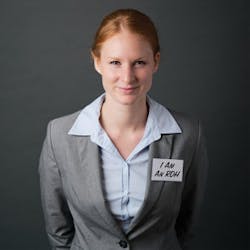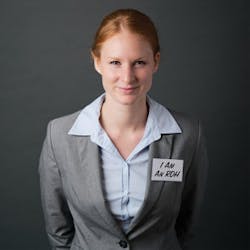Time for a name change? The older definitions of dental hygiene limit the ability to change
By Kyle Isaacs, RDHEP, BHS
The practice of dental hygiene is so much more than scaling and polishing. We are educated, professional health-care providers who are prevention specialists. We are critical thinkers and can make educated decisions about how to best treat our patients. We know more about nutrition than many in the medical field, and we look at the whole person - not just the mouth. Unfortunately, dental hygienists are often viewed as merely the person who “cleans teeth.” Little do many people in the general public realize how hard we studied to earn our dental hygiene degree, and all that we do, can do, as well as the depth of our knowledge. Many of my peers are frustrated - frustrated with time constraints, poor working conditions, and the lack of respect in and out of the profession. If we are to gain respect and be allowed to work at the top of our scope of practice, we need to work hard to change these perceptions. We need to make hard decisions about not staying in clinical practices that want us to see patients every 30 minutes, both for our patients’ well-being and for our well-being. We need to make a stand. We can help advance the dental hygiene profession, but we have a lot of work to do to make that a reality.
We use evidence-based science to make decisions and deliver the best care possible for our patients. So much has changed on how we view oral disease, the systemic relationship, and all of the technology available for diagnostic purposes. We now have devices for early detection of oral abnormalities and caries, as well as salivary diagnostics that can help us determine the best treatment modalities for our patients. Many states have passed legislation to allow us to work in alternative sites without a dentist, to administer local anesthesia and nitrous oxide, and, in some states, perform restorative treatments.
Two-year programs consist of 84 credits. Most, if not all, require about 40 credit hours of prerequisite coursework to even be considered as an applicant.1 By the time a dental hygienist graduates from a community college, they have enough credits for a bachelor’s degree and are capable of so much more than just scaling and polishing. If we want to be recognized as the educated professional health-care providers that we are, we need to step up and start to change the way we view ourselves, how we refer to the work we do, and educate the public, the medical community, the dentists, and colleagues.
Defining the profession
Why are dental hygienists having a tough time? Let’s start at the beginning. Did you know that the first dental hygienists in the 1880s were referred to as dental nurses? Then in 1906, Dr. Alfred C. Fones decided on a different name - the one we still use today, dental hygienist.
Why dental hygienist? Why don’t we question this today? Here are some of the many definitions of dental hygienist in dictionaries:
- A person who works with a dentist and whose job includes cleaning people’s teeth.
- A person trained and licensed to provide preventive dental services, such as cleaning the teeth, usually in conjunction with a dentist.
- A person who works with a dentist and cleans people’s teeth to keep them healthy.
- Someone whose job is to cleanpeople’s teeth and give them advice on how to care for their teeth.
Don’t you think it’s about time we have a new name and a new definition? Who among us is up for the task?
I asked my peers of their perceptions and what they are doing to make a difference. Overwhelmingly, it was pointed out that there is a lack of respect within our profession. This is not to say all dental hygienists feel this way, but it is apparent that many do not question the way things are done thus perpetuating the way we are treated.
Because of a lack of traditional clinical positions, many dental hygienists are employed in less than ideal offices, working under poor conditions. Heidi Mirise is already frustrated only two years after graduation. She says: “One of my doctors respects me and promotes how smart we are to patients. However, I have not experienced this with any of the other ones I’ve worked for. [A doctor at] one office won’t even let me talk when they come in ... I have to write down the suspicious areas and I’ve even gotten called into the office for too much patient education and using big words like biofilm even though I explain what it is to the patient.”
Many of us have been asked to see more patients in less time and take more radiographs, regardless of the patients’ unique needs. Yes, dentistry is a business and we need to be mindful of it. But this does not mean we need to increase production by seeing more patients in less time; there are other ways to increase production and provide much needed care for patients. The point is not to place blame but for us to realize that we need to start doing things differently if we want things to change.
Things we can change
Where do we start? To begin, we need to stop accepting the status quo. Yes, it can be scary, and it takes energy, time, and hard work to enact change. But we can do it and need to do it if we want to elevate our profession.
Look at California, they now have their own governing board. This is definitely a step in that direction. It is one of my dreams that all dental hygienists will be self-regulated, that we govern ourselves and are not under the wing of the dentists.
While working with patients, it is important that we explain why we do things such as reviewing the health history, taking blood pressure, and performing periodontal assessments and oral abnormality screenings. Many patients do not understand what we are doing and the significance of that treatment. Not only will they be more likely to be partners in their care if they understand, they will have a better understanding of who we are and what we can do. I have had patients surprised when I take their blood pressure. They don’t understand the connection at all until I explain the importance.
We need to stop calling what we do “a cleaning or just a cleaning.” What about preventive maintenance or preventive care appointment? Maybe you have some good ideas. It will take a lot of work to get our co-workers to adopt something like this.
Introduce yourself to your patient not only by saying your name, but including that you are a dental hygienist. If you have not been doing either of these, they will feel awkward. Stick with it and the more you practice both, the easier it will get.
What about hanging your degrees on the wall? This can be a jumping off point for sharing about our education, that we take continuing education annually, and that we had to take and pass those tough written and clinical boards.
Christie Lincoln, RDH, says: “I make it my intention, with every patient I see, to share some tidbit of information on prevention through the lens of an RDH. It often starts with medical history review, reviewing any condition that is checked off that I could share a helpful piece of information or suggestion. Take type II diabetes or acid reflux: I don’t just share facts about oral signs and symptoms. I ask about seeing a nutritionist or even ask how their numbers are looking. I strongly believe if we stay in the floss more or gum disease mode, people will continue to see us as just the cleaning ladies and gents, no matter how many ways we spin the conversation, change the analogies, or use scary posters. We have to have whole body conversations.”
The scope of practice in every state will help our cause. As we continue to make strides in passing laws to allow all of us to work in alternative sites, administer local anesthesia and nitrous oxide, and maybe even do restorative, as is already being done in some states, we will be able to elevate our profession. Not only will we be gaining respect but we will also be increasing access to care for so many in need.
National licensure and governing ourselves will also push us towards getting out of the shadow of dentists so that we can work together to provide the best care possible for our patients rather than an adversarial relationship that some but not all dental hygienists experience. Getting reimbursed as health-care providers in all states is a vision we need to keep in sight as we move forward. I know firsthand that this is not a reality yet.
For a long time, most dental hygienists worked in traditional clinical settings. But with more states passing laws about where we can legally work, we can now start to not only get into untraditional settings such as long-term care facilities, but we can also now begin to think about providing care in hospitals and medical offices. Not only will this help patients, but it will also increase awareness of what dental hygienists can do for overall health among the medical community.
At the education level, dental hygiene/dental and medical/nursing students can learn together and from each other. This should help bridge the gap between these professions and how we can deliver optimal care to patients.
We all need to work together to garner the respect we want. We need to be mindful of the words we use. We need to not settle for the way things have always been done, and we need to remember our ethics about patient treatment. I know this may ruffle some feathers by saying this, but if we continue to see 10-12 patients a day, not only are we hurting ourselves, but there is no way we can provide quality care and gain the respect we want.
Recently, I was asked to provide only the basic oral hygiene instructions for my patients. The theory was that I spend too much time with my patients, and the office wanted to get more bodies into the chair. This goes against my ethics, and it perpetuates the simpler definitions of dental hygienists.
What are you going to do today to start garnering that respect?
What about a paradigm shift, and starting with new way of referring to ourselves that tells the whole story? Get out into the community. Volunteer, organize an abnormality screening, and let the public see what else you can do in addition to scaling and polishing. You can start in your office, teaching your co-workers and the dentist you work with new language to refer to what we do and stop calling it “a cleaning or just a cleaning!” Get involved in some way, and get your peers involved. Let’s work together! RDH
Kyle Isaacs, RDHEP, BHS, lives near Corvallis, Oregon, where she works four days a week in a dental office. She also owns a company, Miles 2 Smiles LLC, and provides dental hygiene care in churches, private homes, and schools. She is a member of the American Dental Hygienists’ Association and serves on the board of trustees for the Oregon Dental Hygienists’ Association. She loves to volunteer and comes from a family with many dental professionals. She has been a dental hygienist for 35 years. She is a 2017 recipient of the Sunstar/RDH Award of Distinction.
Reference
1. Dental Hygiene Education: Curricula, Program, Enrollment and Graduate Information. 2014. https://www.adha.org/resources-docs/72611_Dental_Hygiene_Education_Fact_Sheet.pdf

